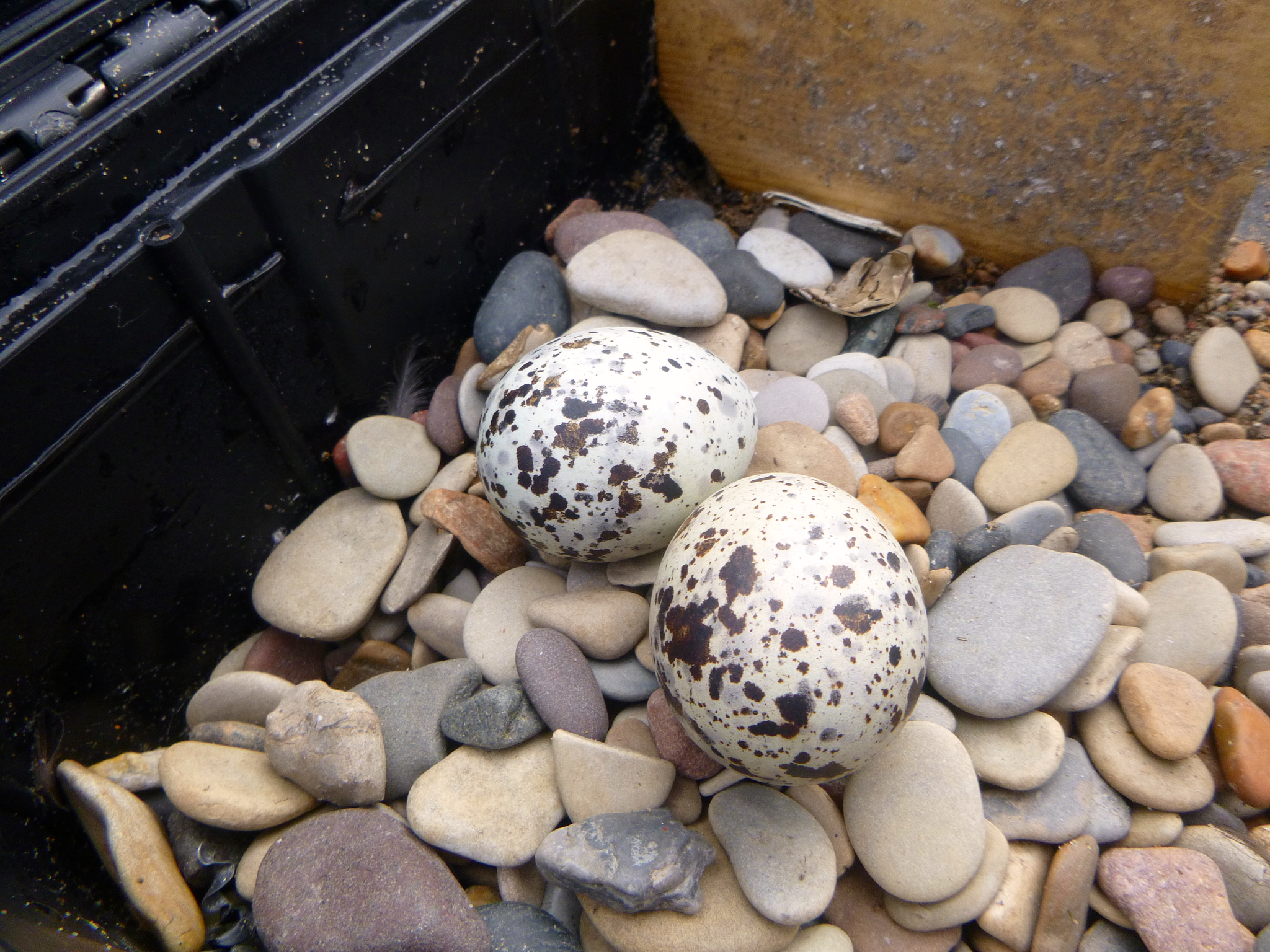The record setting snowmelt in Barrow this spring has resulted in the earliest breeding season for the Black Guillemots on Cooper Island in the 42 years the colony has been studied. Median date of egg laying (when 50 percent of the nests have eggs) was June 16th. Three days earlier than the previous record – set in 2015. Early breeding is important this summer as birds may be able to have their young fledge before the major loss of sea ice predicted for August.
Guillemot Early Breeding Season and New Cooper Island Publications
Fieldwork at the Black Guillemot colony on Cooper Island began in early June, where I began the fifth decade of research on a remote island in a rapidly changing Arctic. Just how rapidly that change is occurring was obvious on the first day in the field, June 11, 2015, when I discovered that egg laying had already begun, with the first egg laid some two weeks earlier than the average date of the first egg over the last four decades. The early laying was a direct result of an extremely early snowmelt in Arctic Alaska that provided Black Guillemots access...
Current Sea Ice Status
The Black Guillemots on Cooper Island have seen their nesting success reduced over the past four decades as sea ice decline has reduced the availability of their preferred prey. Sea ice extent in the Arctic on June 15, 2015 was 9.1 (only one decimal point) million km sq., 10 percent less than the average for that date for 1979-2008. The above images show the proximity of sea ice to Cooper Island currently and for the same week in 2006. For maps from earlier in the summer see the ice information from National Ice Center.
Cooper Island Guillemots and Shell’s Chukchi Sea Drilling Plans
The two weeks before I head north to Cooper Island are always an interesting mix of anticipation of the upcoming three-month field season combined with regret at having to leave my family and friends in Seattle. In recent years, as the Arctic continues to warm, there is a good amount of uncertainty as to what the next field season might bring. While the Nanuk cases now protect the Black Guillemots eggs and nestlings from polar bears forced to Cooper Island because of the melting sea ice, the increasingly frequent decreases in prey availability as the pack ice recedes and seawater...
Cooper Island on PBS in 2003 – Alan Alda, Scientific Americian Frontiers
In 2003 when the Black Guillemots on Cooper Island first started eating large numbers of sculpin in place of the preferred prey of Arctic cod, the PBS Scientific American Frontiers series paid me a visit in August. Their work in Alaska that summer resulted in an hour-long show on climate change issues in the state which led off with the Cooper Island segment. That part of the program can be viewed by clicking on the above image or here. During the short one-day visit it was gray and rainy for much of the time but they were able to get...
Cooper Island on Public Radio’s Science Friday
Had the opportunity to be on Science Friday on public radio last week discussing how relatively minor shifts in temperatures in the Arctic can cause major disruptions and shifts in the region’s habitats. You can listen to the discussion at this link. Habitats Shift As Arctic Temps Creep Above Freezing Cheryl Rosa of the United States Arctic Research Commission (USARC) was also on the show and provided details on a number of issues relating to warming-induced changes in both marine and terrestrial ecosystems. While now Deputy Director of USARC, Cheryl used to be with the North Slope Borough’s Department of Wildlife Management, where...
Nature Night: A Seabird Responds to a Melting Arctic
On March 10, 2015 George Divoky will be giving a talk to the Audubon Society of Portland from 7:00-8:30 at Audubon’s main campus at 5151 NW Cornell Road in Portland, Oregon. More information at this link: March 10 Portland Audubon Talk
Crosscut Article on Our Work
Last April I went to Barrow for a few days to prepare for the upcoming field season and, more importantly, to visit with my colleagues and friends in Barrow without the rushed atmosphere of my visits when I am there heading out to the field or back to Seattle. Without the support and friendship of those in the community of Barrow I never would have been able to conduct seabird research for forty years on a sand and gravel bar 25 miles east of the village. I was accompanied on my April trip by Eric Scigliano, a Seattle science writer,...
Cooper Island Research part of Polar Sea documentary
Cooper Island sits at the western end of the fabled Northwest Passage that has engaged explorers and adventurers for centuries. Cooper Island would not even be called “Cooper Island” if it were not for John Franklin’s attempt (and failure) to navigate from the Atlantic to the Pacific through the Canadian Arctic Archipelago. As the British H.M.S. Plover waited for the Franklin Expedition near Point Barrow, Alaska in August of 1850, they annexed an island with the Inupiat name Iglurak, renaming it Cooper Island (originally Cooper’s Island) after one of their officers. Like all areas of the Arctic, the Northwest Passage is seeing...
Polar bears almost get a guillemot this past summer
A polar bear mother and nearly grown young almost get a brooding guillemot. The parent bird survived and was back on the nest the next day.
